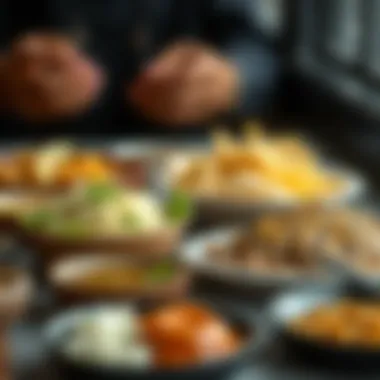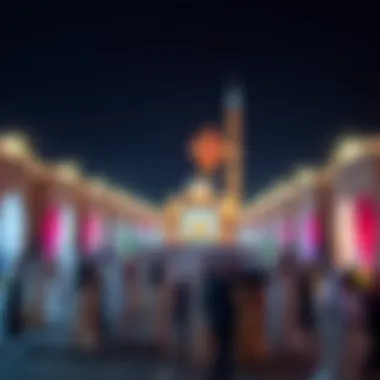UAE National Holidays 2023: Key Insights and Traditions


Intro
The United Arab Emirates (UAE) is not just a mix of skyscrapers and deserts; it’s a tapestry woven with rich traditions, cultures, and histories. As 2023 unfolds, the national holidays of the UAE stand as milestones that not only celebrate significant achievements and events but also reflect the nation’s identity and values. These holidays offer a window into the social fabric of this vibrant nation, bridging the past with the future.
Each holiday resonates deeply with the people, symbolizing unity and pride among the Emiratis. From religious observances to national commemorations, these days are marked by various traditions that enhance their cultural relevance. In this article, we'll dive into each holiday's significance, the customs surrounding them, and how they impact both the society and economy of the UAE.
As we dissect the national holidays of 2023, it’s essential to understand that these are not just days off work; they are someone’s joy, someone's devotion, and often a driver for business and tourism. Let's explore how these observances shape the very essence of life in the UAE.
Preface to UAE National Holidays
National holidays in the United Arab Emirates hold a unique place in the hearts of its citizens and residents. These days are not only a break from routine but also represent the historical milestones and cultural values that shape the nation. Understanding these holidays offers insight into the sociocultural dynamics that drive the UAE's development. As we explore the various aspects of these holidays, readers will uncover not just a list of days off but the very essence of what these observances signify at a deeper level.
Significance of National Holidays
National holidays serve as a reflection of a nation’s identity and shared heritage. For the UAE, these holidays commemorate key events that have influenced its formation and growth. Each holiday provides an opportunity for the populace to come together, express their pride, and acknowledge their shared journey.
Traditionally, these observances allow people to step back from their busy schedules. They can enjoy quality time with family and engage in cultural activities that might be overlooked in everyday life. The significance stretches beyond a mere day off: it instills a sense of belonging and reinforces community ties.
Moreover, recognizing the significance of these holidays can be critical for investors and market analysts. Understanding public sentiment and cultural engagement during holidays allows them to make informed decisions, particularly in sectors such as real estate and retail.
Cultural Importance in the UAE
In the fabric of Emirati society, cultural values are deeply intertwined with religious beliefs and historical events. National holidays act as a canvas upon which these customs and traditions are painted. For instance, events like Eid al-Fitr and Eid al-Adha are centered around family, generosity, and unity, resonating with Islamic tenets.
Celebrations often involve communal prayers, feasts, and acts of charity. In a multicultural nation like the UAE, these holidays also provide a platform for cultural exchange, inviting expatriates to participate in local traditions. Interactive events, exhibitions, and performances create a vibrant atmosphere during these times, highlighting the diverse influences present in the UAE.
Connecting these cultural observances to modern economic activities highlights their dual role in society. For instance, the shopping spikes during holidays are not merely a commercial phenomenon; they signify the community's participation in celebrations, reflecting the joyful spirit that characterizes these times.
In summary, the introduction of UAE National Holidays establishes a framework for exploring how these days are not just points on a calendar. They embody collective memories, foster community bonds, and play a crucial part in both the social and economic landscape of the UAE. Understanding their impact opens a window into the broader implications of cultural heritage in a rapidly evolving nation.
List of Major Holidays in
Understanding the list of major holidays in the UAE for the year 2023 is crucial not only for residents but for investors and industry players alike. These holidays serve as more than just days off; they embody significant cultural values, reflect the region's history, and indicate social trends. Each holiday carries with it a set of traditions and customs that enrich the community, foster family ties, and drive economic activity. Marking these occasions can lead to more opportunities in various sectors, including real estate, where businesses often align their strategies to capitalize on holiday spending.
New Year's Day
New Year's Day on January 1st kicks off the year with celebration across the UAE. This holiday symbolizes new beginnings and offers a moment of reflection. Fireworks light up the skylines of major cities like Dubai and Abu Dhabi, drawing both locals and international tourists. Many real estate developers take advantage of this festive air to launch new projects, attracting potential clients who are optimistic about the coming year.


Commemoration Day
Observed on December 1st, Commemoration Day honors the sacrifices of those who have served the nation. It's a solemn occasion, yet it plays a vital role in shaping national identity. Various events are held nationwide, focusing on the values of bravery and service. Investors might note that this day serves as a reminder of the stability and security that the UAE offers, making it an attractive environment for investment opportunities.
National Day
UAE National Day, celebrated on December 2nd, marks the foundation of the UAE and is a time of joyous celebration. Parades, cultural events, and fireworks illustrate the nation's unity and collective strength. During this period, businesses often reflect on their local contributions and engage in charitable acts. Within the real estate landscape, this holiday is also a prime time for promotions aimed at potential homeowners who wish to be part of the nation's ongoing growth.
Eid al-Fitr
Eid al-Fitr is a major religious holiday that marks the end of Ramadan. In 2023, it is expected to fall on April 21st or 22nd, depending on lunar sightings. This holiday is all about community, family gatherings, and acts of charity. Many families indulge in elaborate meals and traditions, which boosts local commerce significantly. For real estate agents, this is an excellent time to connect with clients, emphasizing the importance of home for familial gatherings.
Eid al-Adha
Eid al-Adha, also known as the
Detailed Analysis of Each Holiday
Analyzing the national holidays of the UAE provides more than just a calendar of days off; it's a window into the cultural spirit of the nation. Each holiday embodies unique traditions, values, and the emotional fabric that weaves the community together. Understanding these elements is essential for investors, real estate agents, and anyone keen on grasping the nuances of UAE society. The observances not only foster community cohesion but also serve as economic stimulants, driving tourism and local business activities. Below, we’ll delve into the rich narratives surrounding each holiday, revealing why they are more than mere dates on a calendar.
New Year's Day: Traditions and Customs
New Year's Day, celebrated on January 1st, signifies fresh beginnings and hope. In the UAE, it’s marked with fireworks displays and grand celebrations. Major cities like Dubai and Abu Dhabi pull out all the stops, hosting spectacular shows that light up the night sky. Beyond the glittering festivities lies a strong emphasis on family gatherings. Some families opt for outdoor barbecues or picnics in parks, cherishing time spent together.
Practices often vary between different nationalities residing in the UAE, reflecting the multicultural aspect of the nation. New Year's Day also sets the tone for the fiscal year ahead, inviting businesses to plan their strategies with renewed aspirations.
Commemoration Day: Understanding its Legacy
Observed on December 1st, Commemoration Day is deeply rooted in the UAE's respect for its martyrs. It’s a time to reflect on the sacrifices made for the nation's unity and security. This holiday fosters a sense of gratitude and national pride among UAE citizens. A significant aspect is the moment of silence observed at 11 am, allowing the community to pause and honor the fallen heroes.
Numerous events take place on this day, including military parades and memorial services at sites like the Wahat Al Karama, a memorial dedicated to the nation's martyrs. Schools and community centers often arrange discussions on the importance of patriotism and sacrifice, allowing younger generations to understand the legacy left behind.
National Day: Celebrating Unity
National Day on December 2nd is a day filled with exuberance as the entire nation celebrates its formation. This pivotal day is marked by festivals, parades, and cultural events that reflect the rich heritage and progress of the UAE. Citizens often don traditional attire, showcasing pride in their identity.
Local municipalities organize various activities, including falconry displays and poetry recitals, highlighting the rich culture of the Emirati people. Businesses often join in the festivities by offering special deals and discounts, making this holiday an important economic period as well. The unifying spirit displayed during National Day reinforces the collective identity of the nation, reminding everyone of the journey from federation to the thriving country it is today.
Eid al-Fitr: Festivities and Family Gatherings


Celebrated at the end of Ramadan, Eid al-Fitr is not just a holiday; it’s a profound expression of gratitude and community. As families gather for prayers in mosques and public squares, the sense of togetherness is palpable. Sharing meals with loved ones, especially traditional dishes, plays a central role during this time.
Traditions include:
- Exchanging gifts and sweets, especially the popular Maamoul cookies.
- Visiting friends and relatives to strengthen communal bonds.
- Engaging in charitable acts, reflecting the spirit of giving that defines Eid.
This holiday also witnesses an uptick in shopping as families prepare for the celebration, significantly boosting the local economy.
Eid al-Adha: Traditions of Sacrifice
Eid al-Adha, the Festival of Sacrifice, has profound significance, commemorating the willingness of Ibrahim to sacrifice his son as an act of obedience to God. Celebrated with prayers, this day emphasizes charity and selflessness. After the prayer, the ceremonial sacrifice of livestock takes place, symbolizing devotion and gratitude.
The meat from the sacrifices is distributed among family, friends, and the less fortunate, encapsulating the essence of sharing. Families often come together for large feasts, making this a highlight of the holiday season. In real estate, Eid al-Adha can lead to increased activity since many view it as a time for new beginnings, prompting home purchases or improvements.
Eid al-Adha reinforces the values of family, community, and service, shaping deeper connections across society.
By analyzing these holidays, one learns about the values that drive the UAE’s vibrant customs and economic landscape. Understanding the nuanced observances provides valuable insight for investors and businesspeople looking to align with local practices effectively.
Impact of National Holidays on Society
National holidays in the UAE are not just days off; they are woven into the very fabric of society. These holidays bring together diverse communities, fostering an atmosphere where cultural exchange and economic vitality can flourish. By understanding the impact of these observances, we grasp how they shape interactions and drive market trends.
Cultural Exchange and Community Events
One of the most telling impacts of national holidays lies in their role as catalysts for cultural exchange. The UAE's diverse population, consisting of Emiratis along with expatriates from various nations, allows for a rich tapestry of cultures to emerge during these observances.
During holidays, it's common to see events rolling out that celebrate this multiculturalism. For instance, during Eid al-Fitr, mosques and community centers host open days, inviting people of various backgrounds to partake in iftar gatherings. An iftar, the evening meal to break the fast, often turns into a vibrant festival where families and friends share traditional dishes, showcasing a culinary blend that represents multiple heritages.
Local organizations may coordinate festivals that include music, arts, and crafts, allowing international artists to collaborate with local talent. This provides a platform for lesser-known cultures to shine in the spotlight, essentially creating a dialogue through art and expression. Through these events, communities engage, networks expand, and shared traditions emerge.
Economic Impact of Holidays
The economic ramifications of national holidays in the UAE are substantial, affecting industries from tourism to retail. When holidays roll around, there’s typically a noticeable spike in consumer spending. Businesses often tailor their strategies around such holiday seasons, creating themed promotions and special sales that keep shoppers coming back for more.
- Hospitality and Tourism Boost: Many people travel within the UAE or from abroad specifically to experience the celebrations. Hotels and restaurants see an uptick in bookings, as locals and tourists alike seek to indulge in special holiday offerings.
- Retail Sales Climb: Local businesses often see a dramatic increase in sales during these periods. Think Eid shopping sprees or National Day deals that catapult cash registers into overdrive. Shoppers searching for gifts, clothing, or decorations can feel a sense of urgency, as holiday-themed sales can generate buzz and excitement.
- Job Creation: Seasonal work opportunities pop up, as businesses require extra hands to manage the surge in customers. This isn’t just for service jobs; many organizations hire temporarily for logistics, marketing, and customer service roles to cater for the increased demand.
"National holidays are the pulse of our economy, reminding us of our connection to culture in a state that champions diversity."
The impact of national holidays can be measured in cultural enrichment and economic vitality. They serve as a reminder that in a rapidly modernizing world, staying grounded in tradition while reaching out for cultural exchanges can yield benefits across different sectors of society. What happens during these days reveals the broader strokes of national identity and the way society is evolving.


Holidays in the Context of Real Estate
National holidays in the UAE offer unique circumstances that can significantly influence the real estate market. These holidays provide both challenges and opportunities for realtors and investors alike. The increase in demand during these festive periods can alter market dynamics dramatically, making it essential for those involved in real estate to understand the implications of each holiday.
During the celebratory times, people tend to search for new homes, invest, or even renovate their existing properties due to the festive spirit. Moreover, holiday periods are often accompanied by long weekends, which encourage family gatherings and socializing. This behavior directly impacts the real estate sector, driving demand for properties that cater to family needs, such as spacious homes or villas.
Thus, the context of holidays is crucial for real estate professionals. Recognizing when people are likely to be active in the market can lead agents to time their marketing efforts effectively. Knowing that families may be planning moves during or shortly after holidays can shape selling strategies and property showcases accordingly.
Realtor Strategies during Holidays
Realtors can maximize opportunities during holidays by tailoring their strategies. Some effective approaches could include:
- Special Promotions: Offering limited-time discounts or special deals can attract property buyers looking during holidays. Promotional events or open houses might also be beneficial as they can draw in more foot traffic.
- Targeted Marketing: Focusing on families during Eid celebrations encourages listings that emphasize large homes or properties with outdoor spaces suitable for gatherings.
- Digital Campaigns: Launching online marketing campaigns that resonate with holiday themes can improve visibility. Social media platforms can be leveraged to depict properties in their best light, capturing the festive spirit in imagery and messaging.
- Networking Events: Participating in community events during holidays can help build relationships with potential clients. Hosting or attending such gatherings creates opportunities to showcase properties casually.
"A well-timed promotional strategy can turn a quiet holiday into a bustling market opportunity."
Market Trends During Holiday Periods
In observing market trends during holiday times, certain patterns emerge that can guide real estate decisions. Firstly, sales typically see a spike before major holidays, as buyers often aim to settle into their new homes before celebrations begin.
The period post-holiday also presents opportunities; many individuals reflect on their living circumstances amid holiday gatherings, leading to increased inquiries about buying or renting properties.
Key trends include:
- Increased Listing Activity: Sellers often list their properties with the hope of cashing in on present buyer interest.
- Diverse Buyer Profiles: With many expats visiting home, there tends to be an influx of overseas buyers looking for investments based on their vacation experiences.
- Price Adjustments: Sellers may be more open to negotiation. The desire to sell can lead to competitive pricing strategies.
In essence, the real estate market functions like a dynamic organism, influenced constantly by various external factors, including national holidays. A savvy real estate agent will utilize these insights to navigate through fluctuations in demand, thereby positioning themselves strategically to capitalize on these festive periods.
Finale: Understanding the Broader Implications
The exploration of national holidays in the UAE transcends mere calendar dates. It delves into the very essence of what it means to be part of a nation. Each holiday serves as a reminder of the country's rich heritage and collective identity, allowing citizens and expatriates alike to join in celebrations that highlight shared values and traditions. By analyzing these festive occasions, one not only grasps the social dynamics at play but also recognizes the underlying economic ripples that memberships of various communities create.
Reflecting on National Identity through Holidays
National holidays in the UAE act as a mirror, reflecting its unique cultural identity. Whether it’s the grandeur of National Day or the spiritual observance of Eid al-Fitr, these days evoke a sense of unity amongst a diverse population. In a region often noted for its vast cultures and traditions, holidays are a unifying thread. These gatherings foster camaraderie, where neighbors exchange greetings, families come together, and various ethnicities share the same joy in festivities. Through shared experiences, people strengthen their ties and nurture a sense of belonging within the larger context of the UAE.
Moreover, such celebrations allow for the preservation and promotion of Emirati values. Traditional practices during these holidays, such as folk dances during National Day, serve to educate younger generations about their roots and history. This is all vital for nurturing national pride. The holidays aren't merely celebrations but events laden with educational value about the land and its people. The emotional resonance of these occasions can bridge gaps between varying demographics and showcase the shared history that everyone contributes to, making it a tapestry richly woven with diverse threads.
The Future of National Holidays in the UAE
Looking forward, how might the national holidays evolve? There’s a palpable buzz surrounding innovation and modernization in the UAE. As the nation steadily embraces the future, one can expect its holidays to reflect this transition. There could be a greater emphasis on inclusivity and modernization while respecting traditional customs.
Technology may change how these holidays are celebrated. Virtual gatherings, augmented reality experiences, and lively online platforms could expand the reach of traditional festivities, drawing younger generations into the fold. Furthermore, as the expat community continues to grow, these holidays might catalyze new traditions that blend local culture with international influences, enriching the tapestry in new ways.
Also, sustainability could become a key focus for future celebrations. With global attention on environmental issues, it’s likely that holiday observances will incorporate eco-friendly practices, ensuring that joy and reverence go hand in hand with responsibility.
In summation, the national holidays of the UAE serve not just as a break from routine but as vital components shaping a collective identity and economic landscape. Understanding their implications fosters a deeper appreciation of what it means to celebrate in this rich cultural mosaic, presenting a vibrant future for the observances to come.











